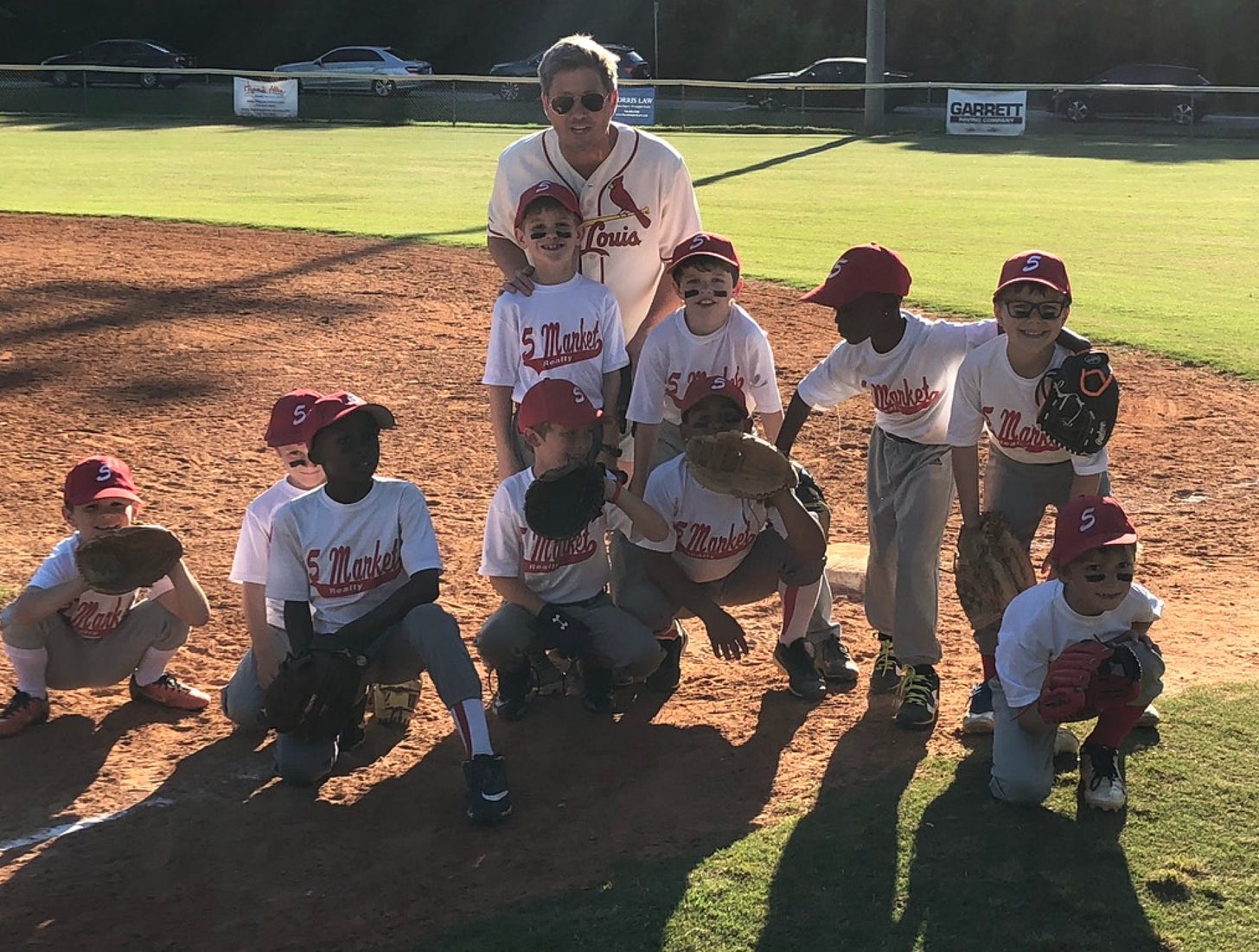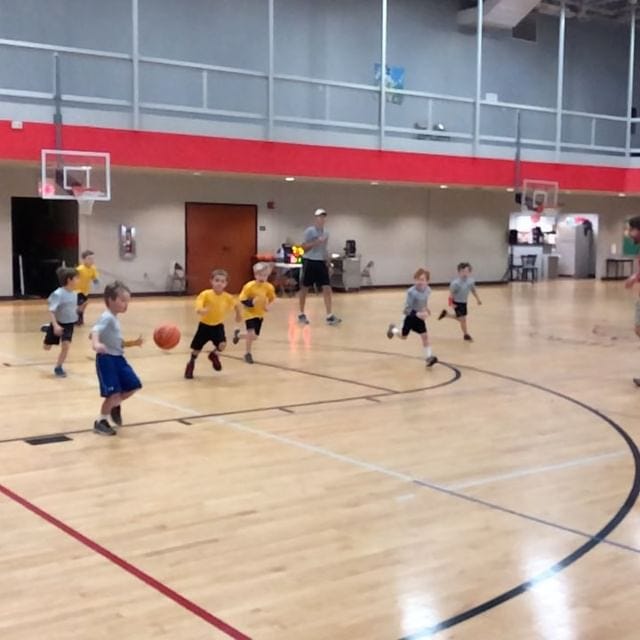Both of my sons play youth basketball every Saturday morning during the winter: I’ll be going to their games shortly after I send this newsletter. The games take place at a local church here in Athens, and they are run, organized and staffed by kids and advisors from the church’s youth group. Each player gets introduced before each game like they’re Jordan and the Bulls, and then everyone comes to center court and says a prayer, thanking God for this game and this court, asking Him to keep everyone safe and hoping for a solid competitive experience regardless of who wins or loses. And then the games begin.
My kids have been in this league for a while, and, suffice it to say, most years, the prayer is quickly forgotten once the games start. Parents scream from the sidelines from the opening tip, at the refs, at their own children, at opposing players. Many coaches encourage their sons to knock over any smaller kids, and I’ve seen particularly large kids actually shove girls on the opposing team. (One of my son’s friends saw this happen last year and straight up tackled the boy who did it. I like that kid.) The winning team is usually the one who bends the rules the most. Two years ago, a coach and a parent nearly got in a fistfight right there on the court; the coach had to be escorted out of the gym and was told he couldn’t coach anymore, though he was back out there the next week.
I don’t coach basketball, but I do coach Little League baseball, and I have found the problems to be even worse there. Most coaches and most parents are out there for the right reasons, to have their children be a part of a team activity and learn all the lessons (and have all the fun) that come with that. But, like with every other aspect of American life, their good intentions are often drowned out and overwhelmed by the bad actors, those who are trying to re-legislate their own athletic failures through their children, those who believe their seven-year-olds are (or should be) obsessed with winning as they are. You can try to stave off these people, but they are loud and they are craven and they are relentless. We had an incident in a game I coached last year that was so ugly, and so driven by those out there for precisely the wrong reasons, that I nearly quit coaching entirely. You try to be the change you want to see in the world. But to quote a line from Terrence Malick’s A Hidden Life: “You can’t change the world. The world’s stronger.”

It can be demoralizing. But then you find like minds.
There are new people in charge of the church youth league basketball this year, and they’ve come up with a radical new way of keeping parents in check, and even of watching a sporting event entirely. The first game of the season was last week, and all the parents sat down on the pull-out bleachers as our kids warmed up beforehand. They dribbled and ran lay-up lines and tossed up half-court shots (my son’s favorite pregame activity), and then came the introductions and the prayer and the opening whistle.
As my son William dribbled the ball up the court, I instinctively looked to the scoreboard, to see how long each quarter was, to see whether his team’s score was the home team or the visiting team. And I realized … I couldn’t see the scoreboard. The new league organizers had angled the clock and scoreboard toward the court and away from the seating area, so that only the players, the coaches and the referees could see it. Fans in the stands could not see the clock, the quarter or, most important, the score. We were watching the game … and that’s all we were watching.
It was amusing at first watching parents attempt to come to terms with this new development. Most people gave a perfunctory, “Oh, that’s nice, that’s a good idea,” but I noticed some of them becoming increasingly agitated as the game went along; one parent kept staring at the back of the scoreboard like she could eventually see the score if she just focused hard enough. One parent kept sending his youngest child out to the court when the action was on the other end to tell him the score, which ended with the referee told him to knock it off before his four-year-old got trampled. My favorite was the parent who, at halftime, walked over to the bench and asked the coach to tell the referee to turn the scoreboard around, as if this had to be some sort of mistake. Not knowing the score of a game involving a bunch of eight-year-olds? What savagery is this?

After a while, with no score and no context, the game stopped being a game and became something peaceful … almost serene. Imagine if you turned on a game on television, and there were no broadcasters, no scores, no ESPN crawl, no overarching narrative at all. It would be a Zen experience. You’d just be watching the game itself, in its purest form, pure athletic competition as it was meant to be. I watched my son dribble the ball up the court and take a wild 3-pointer, and I wasn’t worried about what it meant for the team as a whole, or whether we were ahead or behind, or anything. He dribbled, and shot, and rebounded, and played defense. I just got to watch him do those things. Was his team winning? Was it losing? I had no idea. It didn’t matter. That wasn’t what I was there to watch him for in the first place.
This led to a particularly amusing moment at the end of the game. I didn’t know it at the time—though the teams on the court of course did—the game was tied 28-28 with the final seconds ticking off the clock. (Remember, not only were the fans not aware the game was tied, they didn’t even know it was about to end.) So all of a sudden, out of nowhere, for reasons we didn’t understand, all the players on the court suddenly got in a huge hurry. Everyone started sprinting and screaming everywhere, and taking crazy shots, and looking all frantic. A kid on the other team threw up a half court shot that went in, and everyone jumped up and down, and I guess that meant that was the end of the game? William informed me postgame that the shot went in after the buzzer, so the game ended in a tie. Was this true? Or was it something his coach told his team so they’d feel good about the effort they put in? I have no idea. It doesn’t matter. It never does. They were just playing a game.
Afterwards I found one of the league’s organizers and pulled her aside. She looked exhausted, even a little nervous to see me. “I have to say, hiding the scoreboard from the fans is a brilliant idea,” I said. “I wish every league did that.”
She looked at me and gave me what can only be described as a relieved frown.
“You’re the first parent who hasn’t complained about it to me,” she said. “We did that on purpose. But everyone is so mad about it.”
The frown I returned to her was anything but relieved.
*****************
I understand that I am a bit of a zealot about scoreboards. When I ran Deadspin, I specifically requested that I never be shown any sort of Web traffic report; as I told my boss at the time, “If I’m not getting enough traffic to keep the site worth doing, just go ahead and fire me.” I knew that staring at the big traffic board not only would make me insane, it would twist and distort the site I was trying to create. I wouldn’t try to write things that I thought were smart and good and funny; I would just write things to try to make the little number on the board go up, another gerbil pushing a button to get a treat. I’ve long been a proponent of the idea that you should write everything as if four billion people are going to read it, and also as if no one is going to read it. What you produce shouldn’t be any dramatically different either way. When I was a kid and knew I wanted to be a writer, I didn’t get into it to write dumb shit just so I could have the widest possible audience. I did it because I wanted to engage with other people, to try to make sense of of a world that I already knew was awfully difficult to make sense of. Just because you can make the little numbers go up doesn’t mean you’ve actually done anything. If you just wanted to make the little numbers go up, there are much better professions for you than journalism. They pay better too.
In the early days of the internet, I would argue this was the general consensus; if anything, it was considered untoward, sell-out, sort of gross, to try to create things just to spike your traffic. Then all the ghouls and shitheads and consultants and “disruptors” realized they could make money off the Internet without actually caring about it, and once we let them in the room, there was no getting them out. It was all over right then. Why is the Internet bad now? That’s why the Internet is bad now.
This desperate need to keep score has ruined things that should have been groundbreaking and thrilling. Twitter was initially conceived merely as a real-time communication device, a way for friends to find each other at crowded events like South by Southwest, an alert system for where you were and what you were up to. I mean, Twitter itself is an absolutely amazing service: I can communicate with hundreds of thousands of people, anywhere on the planet, in a matter of seconds. That’s incredible! But the problem is that they put numbers on there, follower counts, likes, retweets, ratios, and once they did that, it turned a revolutionary communication device into just another dick-measuring contest like everything else. It is always baffling to me how much time and energy otherwise intelligent, thoughtful people will put into making sure they get as many likes and retweets as possible, and how despairing they get if they fail to do so. I feel obliged to point out that you do not, in fact, get paid for this: It’s not as if you get a nickel a retweet or something. You only get an empty endorphin rush that just makes you want another one. When you take a step back from it, basically Twitter has convinced thousands of people who get paid for creating things to hand over their most immediate thoughts—and so much of their emotional capital—for free. It’s bizarre. And it’s increasingly self-destructive.
As I get older, the desire or need to please other mass groups of other people, people I don’t know and in many cases have no inherent interest in what I’m doing in the first place, wanes a little more each year. There are probably things I could do to get more readers, to get more clicks on my stories, to have more followers on social media. But to do those things would be contrary to what is probably just my inherent nature—that is not who I am. Maybe it’s a personality flaw, maybe it’s a virtue, maybe it’s nothing at all, but deep down, I don’t really care all that much. I want as many people to read what I’m doing as I can, don’t get me wrong. But I’m not interested in tricking them into it, or pretending to be something I’m not in order to persuade more of them to artificially inflate a number. I just write, about the things I care about, to the best of my abilities, and then trust that there are enough people out there on my wavelength, interested in what I have to say and how I say it, to allow me to keep doing it. I have to write for a hypothetical reader who is engaged and thoughtful and curious enough to care that I’m not just trying to click the scoreboard as much as possible. Do enough of those readers exist? I think so. I truly believe so. But all told, I don’t have any real choice but to believe that. This is the only thing I know how to do.
But I think this is important. There is not The Good Place, where a ledger of points are accumulated that serve as a tally of your life. The only number that counts is yours. The people tallying everything up are not on your side: You must live for yourself, not them. Write like everyone is reading, and like no one is reading. Dance like no one is watching. Play like no one’s keeping score. Because no one’s judgment counts but your own. Shoot that halfcourt shot, William. You won’t remember who won this game today. But you’ll remember that you took that shot.
Here is a numerical breakdown of all the things I wrote this week, in order of what I believe to be their quality.
College Basketball Is Losing All Its NBA Stars, New York. Weekly columns for Nymag are back, though the transition to Vox has screwed up my email, so if you’ve emailed that address and not heard back, that’s why.
The Next Ten World Series Winners Are … MLB.com. I love doing just completely baseless, random predictions. Why not? They’re guesses! We all have no idea!
Five Make-or-Break Seasons, MLB.com. If I were a Phillies fan, I’d be pretty impatient right now.
Josh Donaldson Suitor Power Rankings, MLB.com. The Cardinals should really be in on him.
Bonus Thirty: Who Will Still Be on Each Team in 2030? MLB.com. Some wild guesses here.
The Thirty: 2020 Predictions For Every Team, MLB.com. See? Predictions! Who cares? They’re fun!
Debate Club: Best Star Trek Villains, SYFY Wire. I really don’t know Star Trek well, so Grierson’s carrying me on these.
PODCASTS

Grierson & Leitch, we previewed the 2020 movies we’re most excited about, and we made our Oscar nomination predictions. (They come out Monday morning.)
Waitin' Since Last Saturday, we talked about all the Jake Fromm and Cade Mays madness.
Seeing Red, no show this week, taping on Monday.
MAILBAG

Email me your questions! It’s a new weekly feature. This week’s question comes from David:
What, if anything, should be done about factual errors in movie reviews? It's super jarring to read Roger Ebert's review of "Moneyball" referring to the A's going to the World Series or his review of Groundhog Day calling Rita Phil's "long-suffering producer" when a major point is they were working together for the first time.
Perhaps because Ebert was so prominent, and everything is archived and easily accessible, plenty of people have compiled such errors in his work, but I suspect plenty of other reviewers have made similar errors.
Should years-old reviews be altered? Have corrections appended? Should there be an acknowledgement that they're presented as-is? It seems suboptimal to do nothing.
—David
Ha, first off, I’d never seen that compilation of Ebert’s errors before. I must say, I’d consider it an incredible honor if someone made a thread of minor errors and typos I’d made in my work over the years. I think if someone wants to go back and correct them that’s fine, but I think it speaks to one of the things that made Ebert so great as a movie critic: He was always writing his gut reaction to movies, rather than being pedantic and nit-picky, which is to say, he watched movies the way normal people watch movies. He may misremember some things, but it comes from an honest place. Also, I love when Ebert tried to write about basic sports things and got them so wrong. He clearly didn’t like sports very much, not nearly as much as Siskel anyway, so his sportswriting is a little like an alien trying to describe what humans are like upon seeing them for the first time.
GET THIS LUNATIC OUT OF HERE 2020 POWER RANKINGS

I know it’s sort of fun to dunk on Marianne Williamson, and her little flirtation with vaccination denialism didn’t exactly endear her to me. But by all accounts, her activism and writings have legitimately helped many people with emotional issues and personal problems for decades now. Is that sort of stuff my bag? No. I get a nosebleed just looking at a self-help book in an airport shop. But I’m not sure she’s some crazy kook who existed only to be meme’d either. I’m glad she’s not going to be President. But I think she has made the world a better place rather than a worse one. I’m not sure I can say that for everyone who has ever run for President.
Also: If you were wondering what kind of person obsessively reads every page of the FiveThirtyEight primary forecast model, know that it is me. I am that kind of person.
Also: This was great.
1. Elizabeth Warren
2. Joe Biden
3. Bernie Sanders
4. Amy Klobuchar
5. Cory Booker
6. Pete Buttigieg
7. Michael Bloomberg
8. Andrew Yang
9. Deval Patrick
10. Michael Bennet
11. Tom Steyer
12. William Weld
13. John Delaney
14. Tulsi Gabbard
15. Joe Walsh
ONGOING LETTER-WRITING PROJECT!
I am at last caught up with these. So send me more!
Will Leitch
P.O. Box 48
Athens GA 30603
CURRENTLY LISTENING TO

“Mama, You’ve Been On My Mind,” Bob Dylan. Back watching Rolling Thunder Revue again. I may have some issues with Netflix, but it sure does make rewatching movies I love very easy.
When you live in Georgia, you can still eat outside in January.

Have a great weekend, all.
Best,
Will





